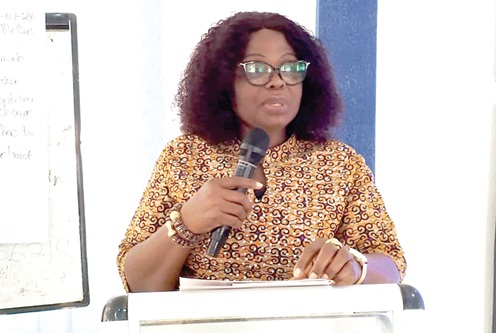
Stakeholders schooled on transport, electric vehicle policies
The Minister for Transport, Kwaku Ofori Asiamah, has said that challenges of climate change and air pollution make it necessary for the country to prioritise its mode of transport.
He said such measures would help to minimise the environmental impact of climate change and promote a cleaner and greener future for the country.
Mr Asiamah was speaking in an address read on his behalf by the Chief Director of the Ministry, Mabel Sagoe, at a national transport policy (NTP) and electric vehicle policy (EV) dissemination workshop in Sunyani, in the Bono Region.
About 200 participants from various sectors of the transport industry and government institutions attended the day's event where they were educated on the contents of the two policies.
Contribution of sector
Mr Asiamah acknowledged the crucial role the transport sector plays in the daily lives of citizens, including providing access to goods and services to support socio-economic growth and improve lives.

The participants
"It is, therefore, essential that we have well-defined policies in place to ensure a sustainable and efficient transportation system," the minister said.
Mr Asiamah said accessibility and inclusivity were the core principles of the revised national transport policy.
"Our transport system must be designed to serve all members of society, regardless of age, ability or socio-economic status," he added.
With the development of the NTP, Mr Asiamah said, it would create a more equitable society where everyone can participate in economic, social and cultural activities without hindrance.
The minister said globally, there was a common understanding that the prevailing energy landscape was not sustainable and posed significant challenges to the environment, economy and future generations.
He said through collaborative efforts, and in line with the national energy transition plan, the national electric vehicle policy was developed to guide the uptake of electric vehicles in the country.
The minister said just like the NTP, the EV policy also went through extensive stakeholder engagements that included metropolitan, municipal and district assemblies (MMDAs), transport operators, service providers, vehicle manufacturers and dealers and private sector entities, among others.
He said reaping the full economic and social benefits of emerging technologies would depend greatly on coordinated participation across both public and private sector stakeholders.
"It is, therefore, imperative for us to work collaboratively to incorporate diverse viewpoints into our national strategy," Mr Asiamah said.
He entreated the participants to share the vision of NTP and EV policies with friends, families and communities, adding: "Be an ambassador for a sustainable transport system for the country".
Agenda
For her part, the Bono Regional Minister, Justina Owusu-Banahene, said the national EV policy was part of the country's agenda to reduce greenhouse emissions.
She, therefore, called for coordinated efforts to bring all citizens on board to ensure the successful implementation of the two policies.
Writer's email:
